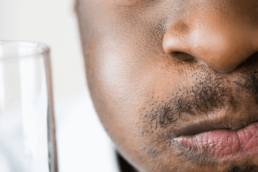Do you get anxious when thoughts of going to the dentist arise? If yes, then you are not alone in your fears.
Sadly, many people put off dental appointments, cancel at the last minute or end up not going at all, which can be dangerous for not just your oral health and overall health as well.
For instance, gum disease, a result of dental issues, can cause problems such as stroke, diabetes, and heart disease.
While it’s not uncommon to feel nervous about a dental appointment, there are ways to effectively and permanently rid yourself of such fears.
These tips will not only rid you of your worries but will help you see the dental clinic as a happy place.
Care to know how to let go of your fears and take charge of your oral health? Read on to find out:
What Are Some Symptoms of Dental Anxiety?
Dental phobia can lead to behavioral, physical, emotional, and cognitive responses. If left unattended, this can cause patients to skip a dental appointment or postpone them indefinitely. Such persons find even simple dental treatments such as dental cleaning fearful.
Patients with dental phobia tend to exhibit the following signs and symptoms:
[list icon=”https://dentalhubantalya.com/wp-content/uploads/2022/05/dental-care.png” icon_color=”#333333″ indent=”4″]- Profuse sweating
- High blood pressure
- Tachycardia (racing heartbeat) or palpitations
- Stomach upset
- Withdrawal or unusual quietness
- Low blood pressure
- Fainting spells (syncope)
- Crying, moaning and other visible signs of distress
- Use of aggression or humor to mask fear
How Dental Anxiety Affects Oral Health
If the thoughts of visiting the dentist leave you with fear, you might skip the dental appointment or procrastinate such an appointment until so much time has passed. This can result in dental problems.
Regular dental appointments enable your dentist to discover any oral issues (such as cavities) early.
Not having your teeth cleaned by a professional can increase the risk of gum disease, bad breath, bleeding gums, loose teeth, and so on.
Is Dentistry Anxiety Common?
Anyone can suffer from dental anxiety; that’s how common it is. Dental anxiety generally refers to the feeling of fear, stress, or unease before or during dental treatment.
According to the National Center for Biotechnology Information, about 5 to 14 percent of Americans experience dental anxiety, while about 80 percent experience a lower level of nervousness.
Causes Of Dental Anxiety
Let’s find out why people are scared to make an appointment, get work done on their teeth, or go for a dental checkup.
[list icon=”https://dentalhubantalya.com/wp-content/uploads/2022/05/dental-care.png” icon_color=”#333333″ indent=”4″]- Fear of Undergoing Pain
Many people believe dental procedures are excruciating. The fear of undergoing such pains makes them anxious.
However, this is not always the case; many dental practices are painless.
Also, even the perceived painful ones, such as dental implants and dental extraction, can be minimally painful as the dentist will administer a local anesthetic to numb the pain.
[list icon=”https://dentalhubantalya.com/wp-content/uploads/2022/05/dental-care.png” icon_color=”#333333″ indent=”4″]- Lack of Control
Some people are scared of visiting the dentist because it leaves them without control. Sitting in a chair with limited movement while a doctor pokes around your mouth can be an intimidating for some people.
This feeling of not being in control makes many worried and fearful of going to a dental clinic.
[list icon=”https://dentalhubantalya.com/wp-content/uploads/2022/05/dental-care.png” icon_color=”#333333″ indent=”4″]- Past Bad Experience
One bad dental experience in the past can cause eternal fear. It may have been a mistake that led to more stitches or an unintentional pain; whatever the case, such a bad experience can scar people for life and prevent them from going to the dentist.
[list icon=”https://dentalhubantalya.com/wp-content/uploads/2022/05/dental-care.png” icon_color=”#333333″ indent=”4″]- Fear of Needle
Otherwise known as trypanophobia, fear of injection or needles affects nearly 50 million Americans. Persons with this phobia tend to exhibit full-blown reactions, including dizziness, chest pain, nausea, and increased heartbeat.
For such persons, the fear of having a needle stuck in any part of their body can trigger a panic attack.
[list icon=”https://dentalhubantalya.com/wp-content/uploads/2022/05/dental-care.png” icon_color=”#333333″ indent=”4″]- Fear of Sedation
According to a 2011 report, the fear of sedation, anesthetic, and numbness significantly affected oral health decline. While fear of sedation is less common than trypanophobia, it’s of no less importance.
People with this phobia are often scared of medication and injections that causes numbness. And because they are anxious, they refuse to take oral pain relief medicines and ask for medical advice or recommendations.
This results in dental issues, including cracked teeth, cavities, hygiene problems, discolored teeth, or gum disease.
Other types of fears include:
[list icon=”https://dentalhubantalya.com/wp-content/uploads/2022/05/dental-care.png” icon_color=”#333333″ indent=”4″]- Fear of doctor
- Fear of the dental materials and equipment
- Fear of the drill
- Fear of the unknown
- Inability to breathe correctly through the nose
- Gag reflex
How to Overcome Dental Anxiety
There are lots of coping mechanisms that can help you overcome dental anxiety. Such coping mechanisms include:
1. Speak Up
People suffering from dental anxiety will attest that speaking up is therapeutic and can help eliminate the anxious feeling. Don’t hesitate to talk about your concerns and hesitations.
Here are some scenarios that present the perfect opportunity to speak up and get help:
[list icon=”https://dentalhubantalya.com/wp-content/uploads/2022/05/dental-care.png” icon_color=”#333333″ indent=”4″]- Appointment booking: When you call to book an appointment, talk to the receptionist about your concerns. The more the dentist knows, the more they can help ease your mind.
- Arriving at the Clinic: When you get to the dental clinic, don’t hesitate to talk to the dental hygienist, staff, or dentist about your nervousness. You can also talk about any past traumatic experience.
- Before the dental treatment: You can ask the dentist to suggest coping strategies to help with your dental phobia.
- During the treatment: Agree with the doctor on a signal you can use if you are scared. If at any point you feel pain, use the sign to call the doctor’s
2. Find a Distraction
If you feel nervous, try distracting yourself. There are many ways to do this, including:
[list icon=”https://dentalhubantalya.com/wp-content/uploads/2022/05/dental-care.png” icon_color=”#333333″ indent=”4″]- Go with a stress ball or a fidget spinner; whenever you feel the fear creeping in, squeeze the object, this will help distract you.
- Listen to music or audiobook over a headpiece or earbuds. In doing this, ensure the volume isn’t too loud so you can hear the dentist and communicate properly.
- Watch TV if available; you can watch a movie on your phone or pad too.
- Visualize a pleasant place you once visited or would like to visit.
3. Deploy Mindfulness Tecniques
The first step to relaxation is putting your mind at ease. Fortunately, there are some coping mindfulness strategies you can do silently while undergoing dental treatment:
[list icon=”https://dentalhubantalya.com/wp-content/uploads/2022/05/dental-care.png” icon_color=”#333333″ indent=”4″]- Practice controlled breathing: Taking a deep breath can make you relax. To do this, close your eyes, inhale slowly through your nose, and hold your breath for a few seconds. Slowly exhale through your mouth. Do this a couple of times over.
- Muscle relaxation and meditation: Meditation and muscle relaxation can help you relax. Deliberately relax your muscles starting with your forehead, cheeks, arms, neck, and down to your toes.
4. Go with a Companion
Having someone to cheer you up, hold your hands and talk to you can help take your mind off the nervousness you feel. Ask your dentist if it’s okay to come with a friend.
Even if you can’t talk to the person; having such a person close can help you feel loved, safe, and at ease.
5. Don’t Arrive Too Early
If you arrive too early, you will have to wait longer before the dentist attends to you. Anxiety can worsen while waiting. To avoid this, don’t arrive too early.
This is not to say you shouldn’t be punctual, but avoid arriving too early, so you don’t have too much time on your hands to let your imaginations run wild.
You can find a spot close to the clinic to relax. Walk around and window shop, dine at a restaurant close by, sit at a coffee shop or visit a nearby library.
6. Conscious Sedation
This is great for people who suffer from mild to moderate levels of dental anxiety. It involves taking a sedative a few hours before the dental visit.
The sedative will keep you responsive and conscious and make you feel relaxed. Conscious sedation isn’t an anesthetic; thus, you won’t have to sleep off while with the dentist.
7. Ask Questions
Asking the right questions and receiving answers can make a world of difference. Throughout your appointment, don’t be hesitant to ask questions or voice
your concerns or discomfort.
Want to know about a particular instrument, ask the dentist. Talk to your dentist if you feel nervous and need a few minutes to put yourself together.
An ideal dental team will provide all the support you need, accommodate your requests, answer your questions, and not dismiss your concerns.
8. Get the Right Dentist
Getting the right dentist can make all the difference. Before engaging a dentist, look out for the following:
[list icon=”https://dentalhubantalya.com/wp-content/uploads/2022/05/dental-care.png” icon_color=”#333333″ indent=”4″]- The dentist should be friendly and should have a caring staff
- Excellent reviews from other patients
- Should be confident and have simple answers to all your questions
- Have a pleasant office
- Use high-tech and personalized dental equipment
CONCLUSION
Having shared tips on overcoming dental anxiety, it’s time to take control of your dental health and eliminate the fear and anxiety preventing you from seeking the best dental care.
Make that call and book that dental appointment today.
Your mouth, gum, and teeth will thank you for it.
- Can Your Mouth Reject a Dental Implant? - September 19, 2022
- What Happens to Dental Veneers After 10 Years? - September 18, 2022
- How to Prevent Dry Mouth While Sleeping? - September 18, 2022



